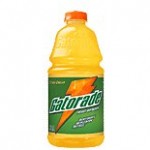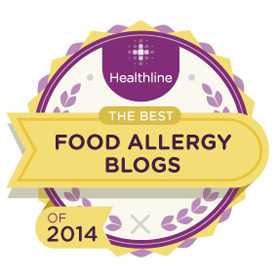I learned recently that some flavors of Gatorade contain brominated vegetable oil (BVO), which is used to keep citrus flavor oils evenly distributed in the drink (they would naturally rise to the surface). BVO is also used in citrus-flavored soft drinks such as Mountain Dew, Powerade, Pineapple and Orange Fanta, Sun Drop, Squirt, and Fresca.
The brominated vegetable oil “typically” comes from soy beans. I’m concerned about the word “typically”, and I wonder if other oils are sometimes used, like peanut, canola, sunflower, cottonseed, or corn oil.
If you are allergic to soy, there is enough allergen in these products to cause an allergic reaction. I know of one soy allergic child who went into anaphylactic shock from Gatorade due to the soybean oil.
UPDATE 10 July 2013: I revisited Gatorade’s website today, and this is what they now say:
“Is BVO (Brominated vegetable oil) in Gatorade?Brominated vegetable oil, also known as BVO, is widely used by beverage makers to help keep flavoring oils well-blended. Since oil does not mix well with water, emulsifiers help dissolve and keep the flavor oils evenly distributed throughout the beverage.We constantly evaluate Gatorade’s products and formulas to ensure they meet the high standards our consumers expect. While our products are safe, we are removing BVO from Gatorade Thirst Quencher because we know that some consumers have a negative perception of BVO in Gatorade, despite being permitted for use in North American and Latin American countries. As part of this process, we began working on an alternative ingredient to BVO for the few Gatorade flavors that contain BVO more than a year ago. We identified a replacement ingredient and plan to have reformulated flavors of Gatorade with absolutely no change to the products’ taste or functionality on store shelves in the next few months.”
I was surprised to learn that Gatorade is lactose free, gluten free, and sulphite free. Gatorade does contain corn syrup.
UPDATE RE DAIRY ALLERGY–> All flavors of Gatorade Recover 03 drinks, which are designed as post-workout drinks with added protein, contain dairy in the form of whey protein. From the Gatorade web site: “Milk proteins such as whey and casein are high quality proteins that have been shown numerous times through research to deliver a muscle recovery benefit. We selected the specific whey protein in Gatorade Recover 03 because it is a high quality protein, capable of delivering the muscle recovery benefit and because it allowed us to deliver a refreshing, great-tasting beverage.”
UPDATE RE BVO BANNED BY US FDA: 8 July 2024
From the National Post:
“The U.S. Food and Drug Administration this week banned the use of brominated vegetable oil, an ingredient once commonly added to citrus-flavoured carbonated drinks. It joins a growing list of nations that have done so, though Canada is not yet among them.
The substance, also known as BVO, has been added to carbonated drinks since the 1930s to ensure that citrus flavouring agents remain suspended in the liquid and don’t float to the top.
However, studies on animals have shown the oil can build up in fat tissues when consumed and can disrupt proper thyroid functioning. The FDA cited a recent toxicology report in its decision.
“The proposed action is an example of how the agency monitors emerging evidence and, as needed, conducts scientific research to investigate safety related questions, and takes regulatory action when the science does not support the continued safe use of additives in foods,” James Jones, FDA deputy commissioner for human foods, said last year when announcing the proposed ban.
Countries that have banned BVO include Britain (since 1970) India (1990), Japan (2010), and the European Union. Canada is not yet on that list, but in May of this year Health Canada announced a proposal to remove BVO from its list of permitted food additives with other accepted uses.
The Post has contacted Health Canada for comment but has not heard back as of publication. However, the proposal suggests the ban will take effect sometime this year. It’s not clear if any soft drinks sold in Canada currently contain BVO.”
Source:
https://nationalpost.com/news/us-fda-bans-soft-drink-additive-health-canada, accessed 8 July 2024
Sources:
http://www.gatorade.com/frequently_asked_questions/default.aspx, accessed 6 September 2011.
http://www.livestrong.com/article/43161-list-ingredients-gatorade/, accessed 6 September 2011.
http://wardmulroy.com/gatorade/DOCS/1/content(9).html#ans12,
accessed 10 September 2011
http://www.gatorade.com/frequently_asked_questions/default.aspx
Accessed 6 October 2011
https://cu.pepsico.com/gatorade
accessed 10 July 2013
* If you found this post helpful, I would love for you to use the “Sharing Is Caring” bar (below) to share this post via Facebook or Twitter. If you’re reading this as an e-mail message, you need to jump over to my blog first by clicking here.










Quite a few really valid factors! I value you creating this article plus the rest of the website is also really wonderful also.
Here’s some interesting information from a reader: Gatorade has certainly undergone changes since it was originally created. In 1965 Gatorade contained sodium, sugar, potassium, phosphate and lemon juice. A safer alternative to Gatorade would be Coconut Water….all the health benefits of balancing the electrolytes and rehydration without the allergens, food dyes and high fructose corn syrup.
Elizabeth added the update in regards to my letting her know that there was milk ingredients in this version of Gatorade. My 11 yr. old son, who drinks Gatorade on a daily basis wanted to try this new version. He opened it, took 3-4 sips but didn’t really care for the flavor. Within a minute of ingesting that little bit his throat and tongue began to itch and his lips began to swell. He quickly read the label and saw that it contained milk. I quickly dosed him with benadryl and within 30 min. or so he was fine. Neither one of us had thought to check the label because he had had Gatorade hundreds of times before. Had he liked the flavor, he would have drank the whole drink down which no doubt would have resulted in a trip to the ER.
Saved as a favorite, I really like your blog!
Thank you for writing this warning Elizabeth. Our daughter who is 8 was the child that Elizabeth is referring to. She suffered a very serious reaction upon drinking about 1/4 of a bottle of Gatorade. Reese’s soy allergy is relatively new. She is also allergic to Peanuts, Treenuts, Eggs, beans and peas. We had been told oils and lecithen would be okay as they contain no proteins. She has safely consumed the lecithen in forms of candy etc. I actually missed the soy on the Gatorade as it was partially covered by a sale sticker and I was distracted by my two year old throwing a tantrum so I failed to note the covered ingredients. Reese reacted for 4 days. She required decodron, benadryl every 4 hours for 4 days, prednisone and ventolin and missed 3 days of school. Her wheeze and swelling of her throat came back as soon as the meds started to wear off. It was one of her worst reactions to date. I contacted the company, they were very good in getting back to me and even broke down the amount Reese would have consumed. Soy is widely overused and is one of the top ten allergens. I hope companies start to recognize this. When Reese was first diagnosed it was probably the hardest one we’ve had to deal with because they put it in almost everything that is prepackaged, so trusted brands are no longer trusted. We changed our way of thinking about food and about we no longer go to restaurants, but I hope our story will prevent anyone else from making the same mistake I did with the Gatorade.
This is great info. Thank you. Alexa had an allergic reaction to Gatorade when she was 2. we watered it down but were on our way to florida and she was suffering from an ear infection. Dr. Recommended it. We thought it was the Red dye 40 but may have been the BVO since she’s allergic to soy. Thanks for the valuable info!